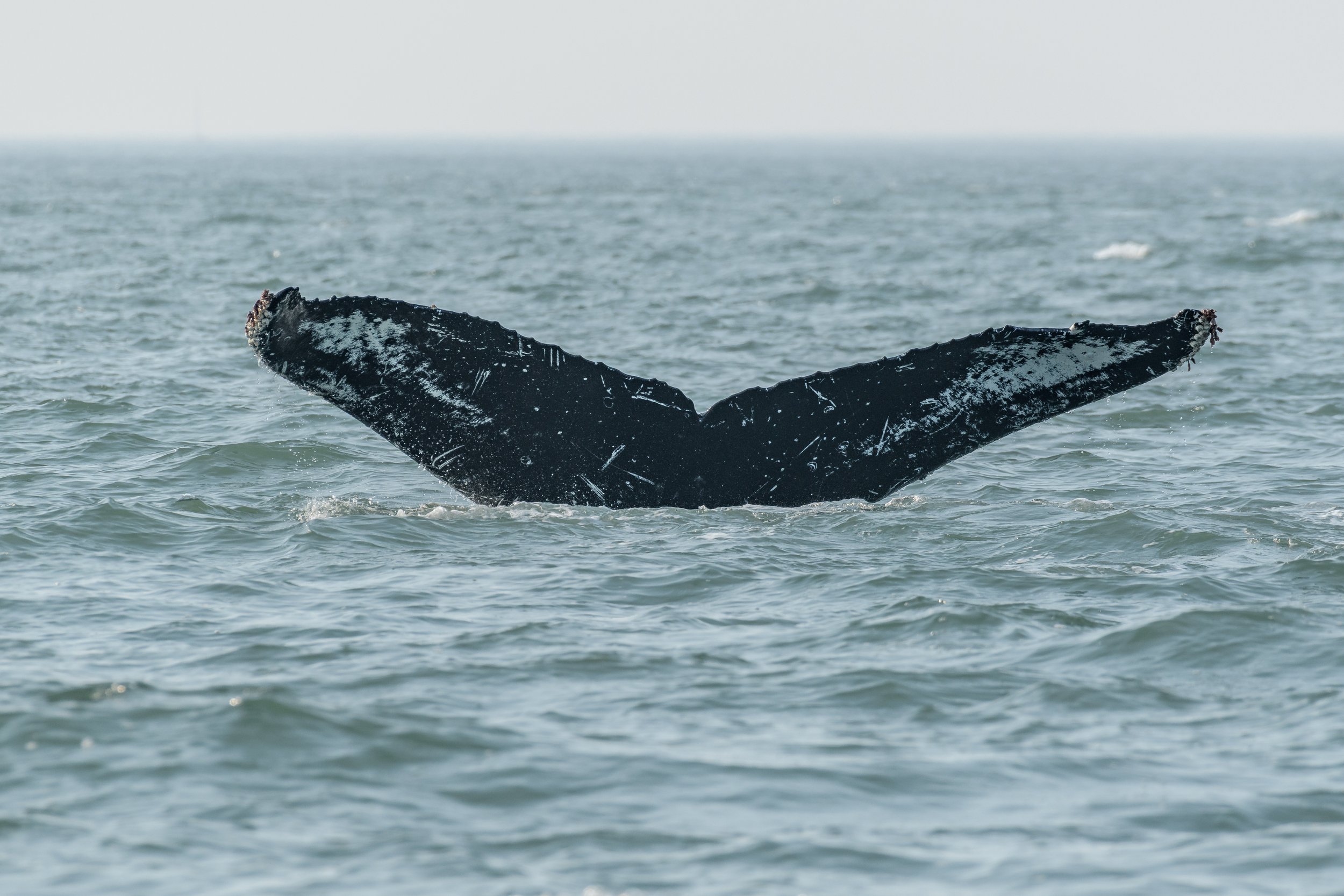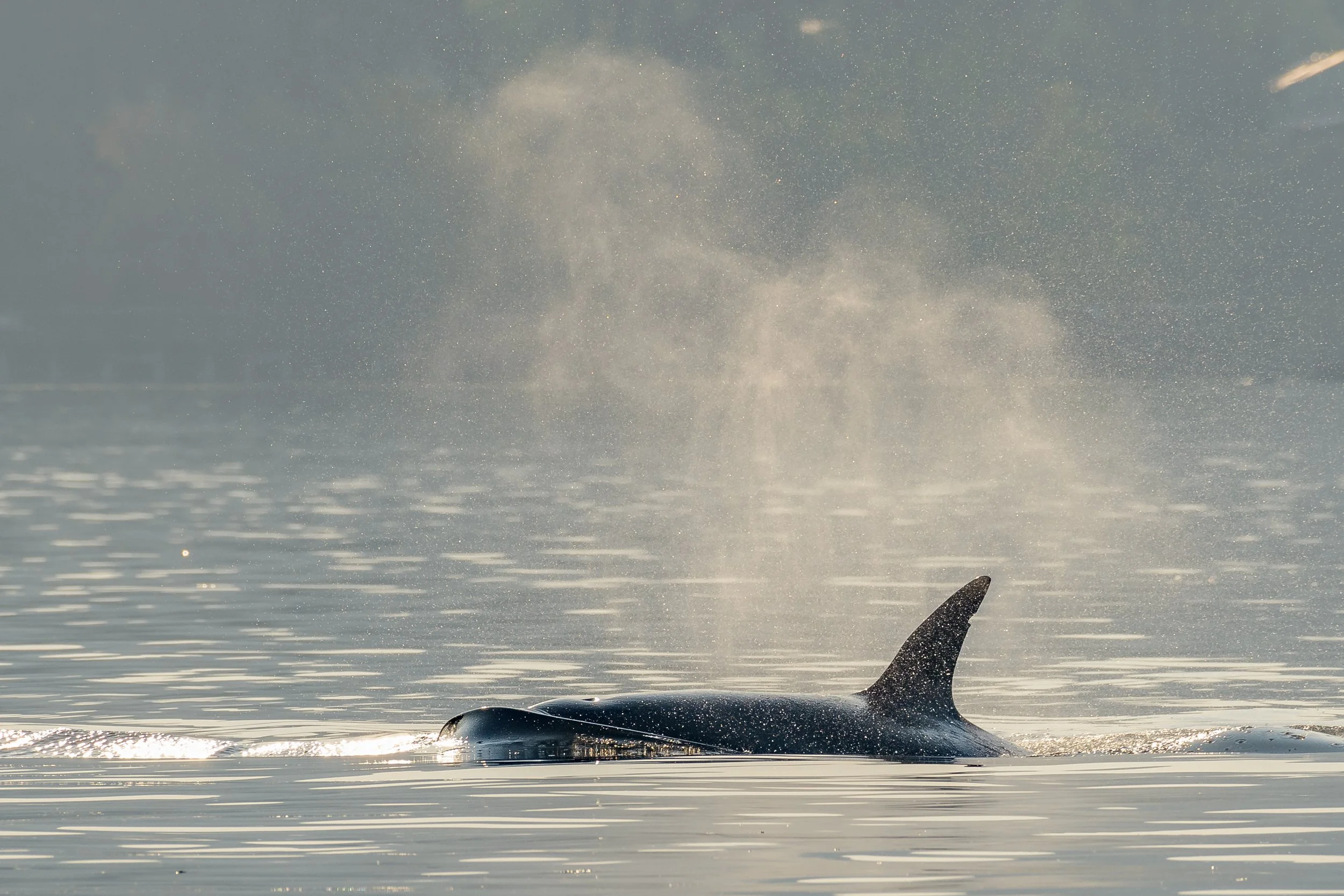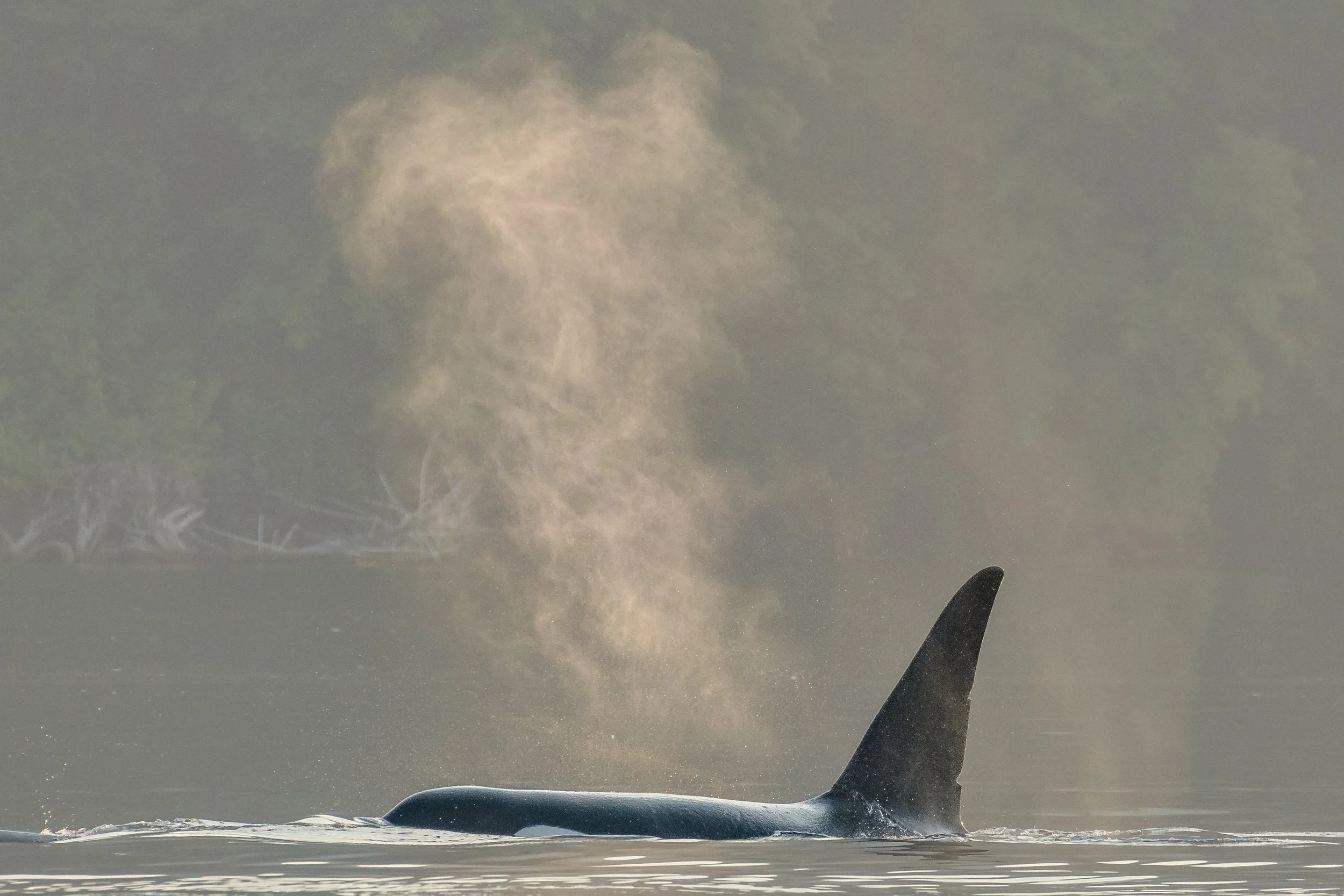August 26, 2023, 3:30 PM - T-Party time!
Off we go! Fueled by the energy of a great morning with the whales, we headed back out to see if we could catch up with the groups from the first tour. We headed south, towards the Gulf islands to see who we could find. It wasn’t long before we came across a couple of whales we saw earlier in the day, T019 Nootka ♀ (1965) and T019B Galiano ♂ (1995). These two had split up for the rest of their family, a very common occurrence for the T019s. The other two members of the pod were probably nearby! These two seemed to be spending a little longer under the water after all the morning activity, so we didn’t get a ton of pictures. We left them to their travelling and continued on our way.
Heading towards Galiano Island, we soon came across our first humpback, BCY0893 Windy. Windy is a male humpback first spotted in 2011, so he is at least 12 years old. Humpbacks reach maturity around age 10, so Windy is a full-grown male! Humpbacks naturally differ in size between the males and females, but girls reign supreme in these huge cetaceans! Adult females can reach up to 50 feet long, and generally weigh a bit more than their male counterparts, at approximately 40 tons! The males are slightly smaller, usually by about 6 feet and can range in weight from 25-30 tons. Windy was on his way north, probably in search of some good food in the area! Our waters in the Salish Sea are very cold, so it’s the perfect place for our humpbacks to feed on krill and plankton, which thrive in our nutrient-rich waters. After saying goodbye to Windy, we headed into the Gulf Islands, through Porlier Pass towards Vancouver Island.
Near the Crofton area, we came across quite a few orca, splashing around in the calm evening waters. We had a T-party on our hands! Today’s whales include:
T137 Loon ♀ (1984)
T137A Jack ♂ (2002)
T137B Tempest ♀ (2006)
T137D Wright ♀ (2012)
T002C Tasu ♀ (1989)
T002C1 Rocky ♂ (2002)
T002C3 Lucy ♀ (2011)
T002C5 (2020)
T037A2 Inky ♂ (2009)
T023 Janice ♀ (1964)
T023D Axle ♀ (1993)
T023D4 Sixx (2015)
T023D5 (2019)
While Orca tend to travel with their own families, we often see them congregate together and socialize. T parties are usually full of really interesting behaviours, and we saw that today! It’s a great opportunity for families to hunt together, chat, play and canoodle. The whales were quite excited that day, and we saw lots of breaching, moonwalking, and heard a good amount of chatter on the hydrophone. Orca are the largest members of the dolphin family, so communication between animals includes a series of squeaks, whistles and clicks. However, it’s not uncommon that the males, especially juveniles, get ‘excited’ in other ways as well. Our naturalist got some great shots of all the action if you know what we mean. A warning to readers: orca ‘Sea snake’ (penis) pictures ahead! In full seriousness, social parties like this are vital in increasing the genetic diversity of the Transient populations and are important to build up healthy, stable populations over time. Orca have highly complex social structures, and like to hang out with others just as much as we do! The ‘excitement’ the males display is also a normal part of play between members. Other behaviours seen in play include tail slapping, spy hops, and porpoising. We believe T037A Volker and the rest of the T037As were also present today, but the party was quite split up so we were able to confirm if they were present.
We finished off the tour with a slow trip home, stopping to see a Great Blue heron fishing in the shallows off one of the many rocky coastlines the Gulf Islands have to offer. And of course, guests were treated to a spectacular sunset, a definite perk of the evening tours!
All photos were taken by Marine Naturalist Aly Kohlman.
The left side of Windy’s dorsal fin as he prepares to dive. Photo by Aly Kohlman.
Look at those Barnacles on Windy’s tail. Photo by Aly Kohlman.
The underside of Windy’s Fluke which we use to ID him! Photo by Aly Kohlman.
T023D4 Sixx, T023 Janice, and a couple of others hidden by the blows! Photo by Aly Kohlman.
T023D4 Sixx, T137D Tempest and T137 Loon surfacing together. Photo by Aly Kohlman.
T137D Wright in the sunshine. Photo by Aly Kohlman.
T137A Jack doing a big tail slap! We ca tell it’s him from the healed scarring on his tail peduncle. Photo by Aly Kohlman.
T137A Jack surfacing showing off his eye patch. Photo by Aly Kohlman.
Another aspect of orca socialization, can you spot the “Sea Snake” in this photo? Photo by Aly Kohlman.
T137A Jack surfacing. Photo by Aly Kohlman.
T137B Tempest and T137D Wright travelling together. Photo by Aly Kohlman.
T023 Janice with her face out of the water! If you look carefully you can spot her eye open in the photo! Photo by Aly Kohlman.
Beautiful backlit blows from a couple of our party members. Photo by Aly Kohlman.
A fin-tastic look at T137A Jack. Photo by Aly Kohlman.
T037A2 Inky surfacing in the sun. Photo by Aly Kohlman.
A full ‘Sea Snake’ - it isn’t common to get a shot like this! Photo by Aly Kohlman.
A couple of tails in the air and another Sea Snake. Photo by Aly Kohlman.
A beautiful tail slap. Photo by Aly Kohlman.
Tail slap! Photo by Aly Kohlman.
A nice close look at one of the whales! Photo by Aly Kohlman.
T023D Axle giving us an up-close look. Photo by Aly Kohlman.
A Great Blue Heron hunting in the shallows. Photo by Aly Kohlman.
Success! The Great Blue Heron caught a fish! Photo by Aly Kohlman.
Yummy! Photo by Aly Kohlman.
A beautiful sunset over Nanaimo. Photo by Aly Kohlman.

























